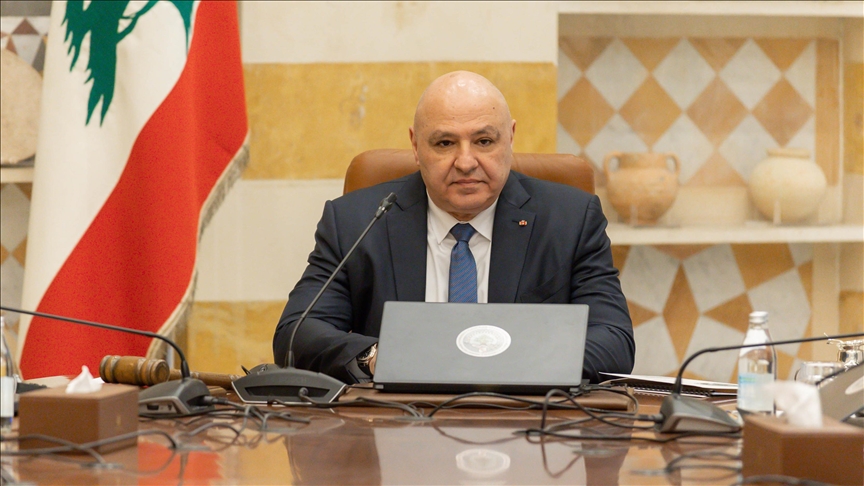Lebanese president says state to take control of all arms in country through 'dialogue'
Joseph Aoun describes decision as irreversible, stressing 'it received wide support from the Lebanese people and brotherly, friendly countries'
 Lebanese President Joseph Aoun
Lebanese President Joseph Aoun
BEIRUT / ISTANBUL
Lebanese President Joseph Aoun said on Tuesday that all weapons will be brought under state control without causing any security disturbances in the country, according to a statement his media office released.
Aoun’s remarks came during his meeting in Beirut with a delegation from the Washington-based Middle East Institute, headed by retired US General Joseph Votel.
Aoun reiterated his country’s commitment to the decision of bringing all weapons under state control, stressing that it is “irreversible because it received wide support from the Lebanese people and brotherly, friendly countries.”
Withdrawing weapons will not disrupt the country's security, but will be accomplished through dialogue with those involved, he said.
He emphasized the army's urgent need for military assistance and called on the United States to help Lebanon achieve stability and security.
Las week, the Lebanese president said in an interview that Hezbollah members could join the Lebanese army and "undergo integration training."
Hezbollah Secretary-General Naim Qassem, however, stressed that his group would not allow its disarmament.
"We will never allow anyone to disarm Hezbollah or the resistance; this idea must be erased from consideration," Qassem said.
Southern Lebanon
The president said the Lebanese army is fulfilling its duties in the south of the Litani River by fully implementing UN Security Council Resolution 1701.
This resolution, adopted by the UN Security Council on Aug. 11, 2006, called for a complete cessation of hostilities between Lebanon and Israel. It also called for the establishment of a weapons-free zone between the Blue Line and the Litani River in southern Lebanon, excluding the Lebanese army and the UN Interim Force in Lebanon (UNIFIL).
Aoun criticized Israel’s continuous presence at five border outposts in southern Lebanon and called on Washington to pressure Israel to withdraw.
A fragile ceasefire has been in place in Lebanon since November, ending months of cross-border warfare between Israel and Hezbollah, which escalated into a full-scale conflict in September.
Lebanese authorities have reported more than 2,764 Israeli violations of the truce, including the deaths of at least 194 victims and injuries to 485 others.
Disputes on the Lebanon-Syria border
Aoun said he closely monitors tensions along the Lebanon-Syria border and that the Lebanese army is stationed there to prevent "all kinds of smuggling activities" and to control free movement between the two countries.
He also emphasized Lebanon's commitment to resettling displaced Syrians in Lebanon, especially since Lebanon cannot absorb them.
On Monday, Lebanon announced that it would establish joint committees with Syria to address outstanding issues between the two countries.
The Lebanon-Syria border, which stretches approximately 375 kilometers (233 miles), is known for its complex geography and includes six official land crossings.
Since the fall of Bashar al-Assad’s regime in December, Syria’s new leadership has focused on restoring internal stability and regaining control over its borders, especially with Lebanon.
The urgency for closer cooperation between Lebanon and Syria was heightened after a border incident in mid-March, when Syria’s Defense Ministry accused the Lebanese group Hezbollah of kidnapping and killing three of its soldiers, an accusation the group has denied.
Anadolu Agency website contains only a portion of the news stories offered to subscribers in the AA News Broadcasting System (HAS), and in summarized form. Please contact us for subscription options.







